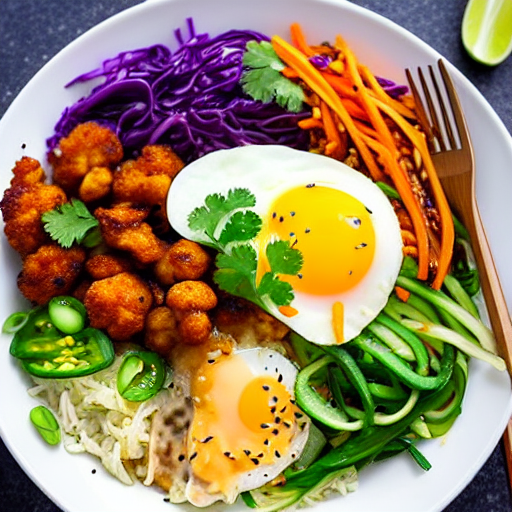Cauliflower Bibimbap
Cauliflower Bibimbap is a vibrant and healthy twist on the traditional Korean dish, substituting rice with cauliflower for a low-carb delight. Packed with colorful vegetables and topped with a fried egg, it's a satisfying meal full of flavor and nutrients.

30 minutes
Difficulty: Medium
Korean
350 kcal
Ingredients
- Cauliflower - 300 grams
- Carrot - 1 medium, julienned
- Zucchini - 1 small, julienned
- Spinach - 100 grams
- Eggs - 2 large
- Soy sauce - 2 tablespoons
- Sesame oil - 1 tablespoon
- Gochujang (Korean chili paste) - 1 tablespoon
- Garlic - 2 cloves, minced
- Sesame seeds - 1 teaspoon
- Vegetable oil - 1 tablespoon
- Green onion - 1 stalk, chopped
Steps
- Begin by washing and cutting the cauliflower into florets. Use a food processor to pulse the cauliflower until it resembles rice grains.
- In a large non-stick skillet, heat 1 tablespoon of vegetable oil over medium heat. Add the cauliflower rice and sauté for 5-7 minutes until tender. Season with 1 tablespoon of soy sauce and set aside.
- In the same skillet, add a bit more oil if necessary, and sauté the minced garlic for 30 seconds until fragrant. Add the julienned carrot and zucchini, cooking for about 3-4 minutes until slightly softened.
- Add the spinach to the skillet and cook until wilted, about 2 minutes. Stir in 1 tablespoon of sesame oil and set the vegetable mixture aside.
- In another small skillet, fry the eggs sunny-side up to your desired doneness.
- To assemble, divide the cauliflower rice between two bowls, placing the sautéed vegetables on top. Add a fried egg to each bowl, drizzle with gochujang, and garnish with sesame seeds and chopped green onion.
Nutrition
- Calories: 350
- Protein: 14 g
- Carbs: 20 g
- Fiber: 8 g
- Sugar: 4 g
- Sodium: 700 mg
- Cholesterol: 186 mg
- Total Fat: 24 g
- Saturated Fat: 4 g
- Unsaturated Fat: 20 g
- Water: 0.5 L
Health Benefits
- Rich in vitamins and minerals from a variety of vegetables.
- Low in carbohydrates, making it suitable for low-carb diets.
Tags
KoreanLow CarbRice Dish